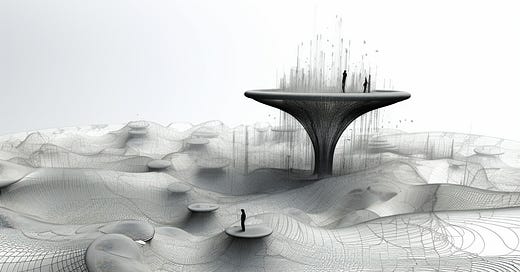In the throes of annual planning. Send help. Apologies for the delay. On the bright side my brain is swimming with post ideas.
"We just need to align incentives!"
How many times have you heard this?
What do most people mean by incentives?
They probably mean money, recognition, promotions, benefits, autonomy, support, purpose, social pressures, feedback, and growth. If we can find the perfect mix of these things, we can solve all our problems.
But we can also consider incentives in the context of complex adaptive systems (aka the place where you work).
Attractors, like incentives, pull a system towards certain states or behaviors. Some attractors encourage stability, while other attractors encourage emergent behavior. A "basin of attraction" is like a bowl—any ball placed with the bowl will roll towards the bottom no matter where it started. This is an apt metaphor for a work situation where, no matter what, you try to fix a problem, the ball keeps rolling back to where it started. But sometimes, we experience a "phase shift" where a system crosses a critical threshold and hurtles towards a new set of attractors—one of the founders leaves their startup, and the situation flips to something very different. The very incentives that teams to succeed in Act 1 may fail them in Act 2.
https://royalsocietypublishing.org/doi/10.1098/rsif.2010.0719
A simplistic take on this might be that you can use incentives to "design" a system. "Get the incentives right, and the rest takes care of itself!" A more nuanced take is that while incentives can be designed and implemented (we certainly can decide on a benefits package or "reward good behavior"), more often than not, incentives emerge, clash, interact, and morph.
Certain company cultures are shaped by a tension between attractors (or incentives). The employees of a company might value the camaraderie and sense of community. Still, this very "niceness" makes it hard to face up to the elephant in the room and avoid the ball dropping to the bottom of the bowl again. In other companies, the sheer clash of incentives defines the actual incentives—team members know that Exec A hates long meetings, and Exec B loves to go deep, so they're constantly making two versions of every document.
Anyone who has been on the losing end of a political battle at work can relate to the following:
The water is "incented" to take the path of least resistance.
The problem with "We just need to align incentives!" is that it tends to revert to the most tangible and controllable incentives—money, reward, "cool projects—and also tends to reflect the worldview of the person "justing".
It is "I was born and raised to believe that humans are just __________________, and I've read a lot of books that happen to back that up, so it is science."
Anyway, the last few weeks have been very busy as I started working on annual planning at the day job. Questions about incentives pop up almost every hour in one way or another.
I have written about games and the idea that we can think about some aspects of work as game design. Sometimes, designing an approach to annual planning DOES feel like game design and trying to align incentives. But it also reminds us how little we control and how diverse people are in their needs and demands on others. Instead of trying to align incentives, you realize it is more about creating conditions where people can shape their environment and benefit from the disposition of their environment.
Incentives go from enabling to perverse in the blink of an eye.
It is the efforts to align incentives that are most prone to backfiring.







I have also noticed that people in higher positions think they are incentivizing their reports by being an example on how to behave but lack the self-awareness to realize that their own behavior is incentivizing their reports to develop undesired traits.
For example, managers that say that they want their reports to "own" things but them keep on overriding their decisions because they also want to "own" everything under the sun. They end up showing that "owning" things is a frustrating effort and that is better to wait for a top-down decision.
Decision-makers are often beneficiaries of a certain set of incentives that motivate only a subset of the wider employee base towards new behaviors. This disconnect is at the root of a lot of frustration (on both sides)